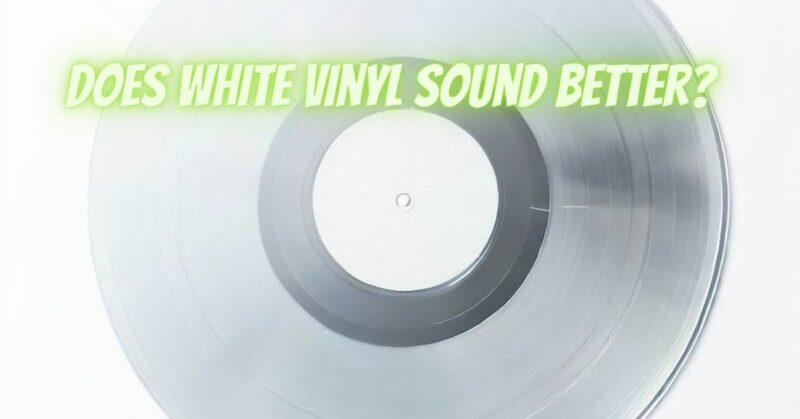Vinyl enthusiasts often appreciate the allure of colored vinyl records, with white vinyl being one of the most visually striking variants. While the aesthetics of white vinyl are undeniable, the question that arises is whether white vinyl offers any sonic advantages over standard black vinyl. In this article, we’ll explore the characteristics of white vinyl records and whether they truly deliver a superior listening experience.
The Impact of Vinyl Color on Sound:
The color of vinyl records itself does not have a direct impact on sound quality. Vinyl records are primarily made of polyvinyl chloride (PVC), with pigments or dyes added to achieve the desired color. These colorants are typically inert and do not affect the sound reproduction of the vinyl.
Sound Quality:
The most crucial factors influencing the sound quality of a vinyl record are not its color but rather:
- Quality of Pressing: The manufacturing process and the quality control measures in place at the pressing plant play a significant role in determining sound quality. Well-pressed vinyl records, whether white or black, can provide excellent sound quality.
- Mastering: The mastering process, which involves creating the master lacquer from which records are pressed, has a significant impact on sound quality. The expertise of the mastering engineer and the care taken during this process are crucial.
- Playback Equipment: The quality of your turntable, tonearm, cartridge, phono preamp, and speakers greatly influences the sound you hear. A high-quality playback system can reveal the full potential of any vinyl record.
- Record Condition: The condition of the vinyl record, including cleanliness and the absence of scratches or wear, is essential for preserving sound quality.
Visual Appeal vs. Sound Quality:
White vinyl records are often chosen for their visual appeal and collectibility. The vibrant, pristine appearance of white vinyl can be visually striking and add to the overall aesthetic of a vinyl collection. However, this visual appeal does not inherently translate into superior sound quality.
Collectibility:
White vinyl releases are sometimes produced in limited quantities or as special editions, making them highly collectible among vinyl enthusiasts. The collectibility of white vinyl can add to its appeal for collectors, but it does not guarantee better sound quality.
In conclusion, white vinyl, while visually striking and collectible, does not inherently offer better sound quality than standard black vinyl. The sound quality of a vinyl record depends on factors such as the quality of pressing, mastering, playback equipment, and the condition of the record itself. Audiophiles and vinyl enthusiasts should focus on these critical factors when evaluating the sonic performance of a vinyl record, rather than its color.
While white vinyl can be a desirable addition to a vinyl collection, it’s important to appreciate it for its visual aesthetics and collectibility rather than expecting a significant sonic advantage over black vinyl. The true magic of vinyl records lies in their ability to deliver an authentic and immersive listening experience, regardless of their color.


